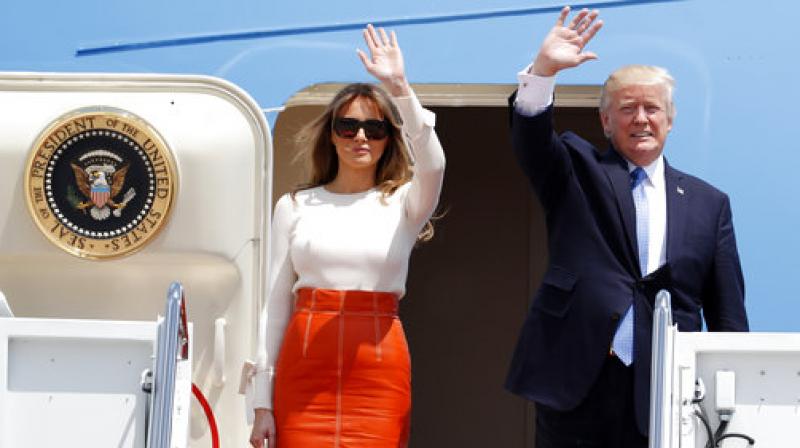Seeking a new narrative, Trump embarks on trip to Middle East, Europe

New York: President Donald Trump left for Saudi Arabia on Friday on the first leg of a trip that the White House hopes will shift attention away from the political firestorm triggered by his firing last week of former FBI Director James Comey.
The trip, which also includes stops in Israel, Italy and Belgium next week, has been billed by the administration as a chance to visit places sacred to three of the world's major religions while giving Trump time to meet with Arab, Israeli and European leaders.
But uproar in Washington threatened to cast a long shadow, after Comey's firing, allegations Trump had previously pressed the FBI chief to stop investigating former national security adviser Michael Flynn, and the subsequent appointment of a special counsel to look into alleged Russian meddling in the 2016 election and possible ties to Trump's campaign.
"Getting ready for my big foreign trip. Will be strongly protecting American interests - that's what I like to do!" Trump said on Twitter hours before he left on his first foreign trip since taking office in January.
Trump, who has embraced what he describes as an "America First" approach to US foreign policy and international trade, is expected to be welcomed warmly by leaders in Saudi Arabia and Israel.
Lingering questions over his views on the Iran nuclear deal, commitment to NATO security and scepticism of the Paris climate agreement, however, could generate tension at meetings with European counterparts in Brussels and Sicily.
"It's almost always true that when a president goes on a big foreign trip, especially one that has some important summits ... that dominates the news and knocks most other stuff out," said Republican strategist Charlie Black.
"Whether by accident or design, this will help him in terms of Russia news for a while."
Trump, who has expressed a desire for friendlier relations with Moscow, drew a storm of criticism this week when it emerged that he had shared sensitive national security information with Russia's foreign minister during a meeting last week in the White House.
The president was already under attack for firing Comey in the midst of an FBI probe into Russia's role in the 2016 election and possible collusion with Trump campaign members. Moscow has denied any such interference. Trump has denied collusion and denounced the appointment of a special counsel as a witch hunt.
His fellow Republicans in Congress have expressed frustration that Trump's pro-business economic agenda, highlighted by a plan to cut corporate and individual taxes, have been pushed to the backburner by the turmoil.
"He clearly did have a bad two weeks. And clearly it's my hope that he does ... right the ship, that he improves so that we can just get going," Republican House Speaker Paul Ryan said on the Hugh Hewitt radio show on Friday.
Message of unity
The White House has laid out three purposes for Trump's trip: reaffirming US leadership, building relationships with world leaders and broadcasting a message of unity to US allies and to the faithful of three of the world's major religions.
Trump generated controversy as a presidential candidate with a call for a temporary ban on Muslims entering the United States, which he called a national security plan to prevent Islamist militant attacks. A measure he has issued since taking office to impose a temporary travel ban on people from six Muslim-majority countries has been blocked by courts.
National security adviser HR McMaster told reporters on Thursday that Trump would deliver a speech in Saudi Arabia expressing hope that a peaceful vision of Islam would resonate worldwide.
The national security adviser, who publicly defended Trump this week, has a lot riding on the trip himself.
"He's already on thin ice after his attempt to defend the president's discussion of intelligence with the Russians, and he urged the president to do this trip, which may have been a bad idea," said one US official. "It's too long and covers too much ground and too many topics. If it goes badly, no matter whose fault it is, it will be HR's."
Although he kept a gruelling schedule as a presidential candidate, Trump is fond of being home at night. During the election campaign, he often flew back to New York after events to sleep in his own bed. The nine-day trip will be his longest since he became president.

